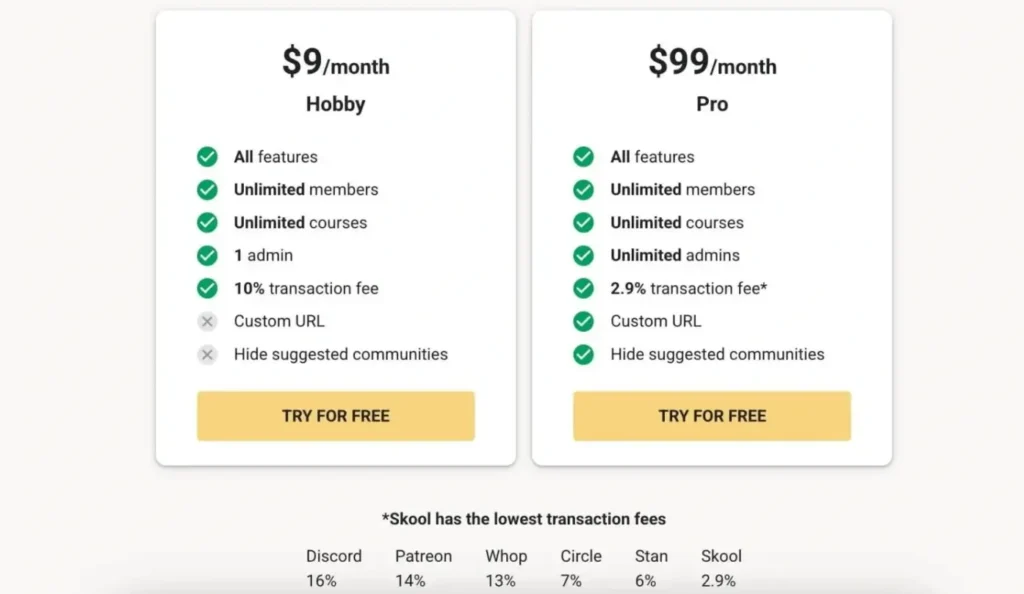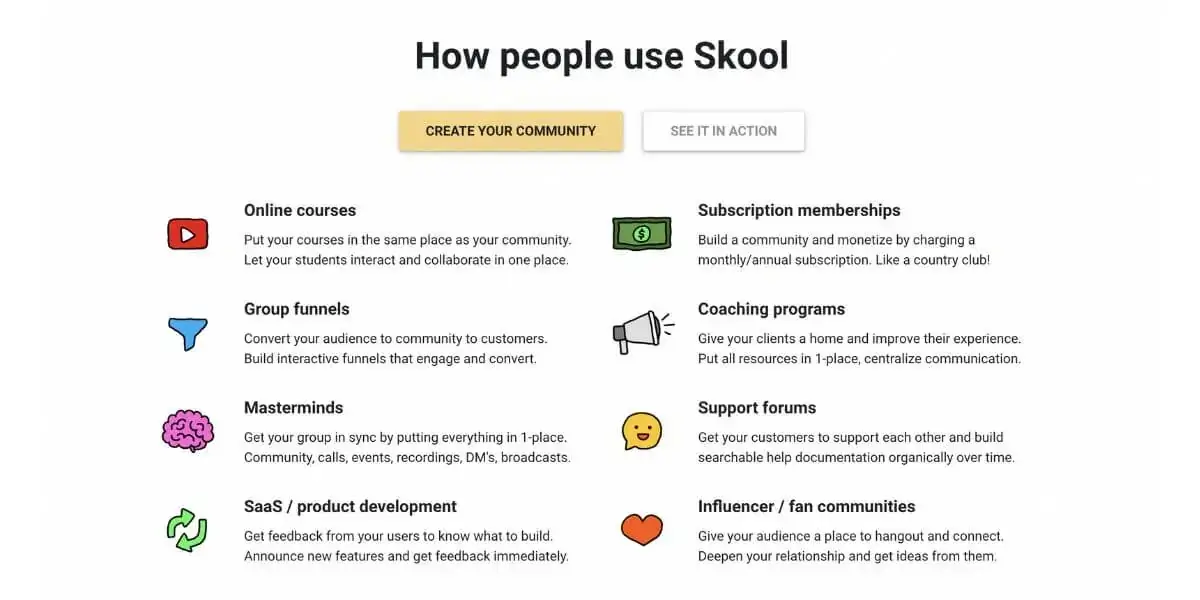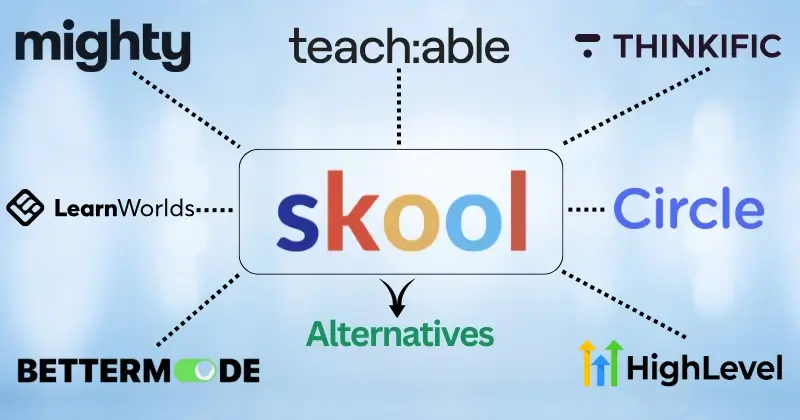Table of Contents
Introduction
Skool review for online educators is essential reading before you commit to any online teaching platform. If you’re looking for a space to build your community, manage courses, and engage students seamlessly, understanding Skool’s strengths and weaknesses can save you time and effort. This article will guide you through everything you need to know about Skool, from its unique features to pricing, user experience, and alternatives.
Understanding the Skool Platform

Skool is an innovative online platform designed specifically for educators, coaches, and creators who want to build vibrant learning communities. Unlike traditional course platforms, Skool combines course management with social networking features, creating a seamless environment where online educators can engage students more effectively. The platform’s key features support community building by allowing educators to create groups, host discussions, and encourage peer-to-peer interaction—all within one easy-to-use interface. Additionally, Skool integrates course management tools such as lesson delivery, quizzes, and progress tracking, making it a comprehensive solution for managing both content and student engagement. This unique combination of social and educational tools makes Skool a popular choice among online educators looking for more than just a standard learning management system.
Benefits of Using Skool for Online Teaching

One of the standout benefits of Skool is its ability to help online educators create an interactive and supportive learning community. Unlike many platforms that focus solely on course delivery, Skool emphasizes social interaction by offering features like discussion boards, member profiles, and group messaging. This fosters a sense of belonging among students, encouraging collaboration and peer support, which are crucial for effective online learning. By building a strong community, educators can increase student engagement, motivation, and course completion rates.
Another major advantage of Skool is how it simplifies course delivery and student communication. The platform integrates lessons, quizzes, and assignments into a streamlined dashboard, allowing educators to organize and manage their content effortlessly. Communication tools like announcements, direct messaging, and notifications keep students informed and connected without the need for multiple apps or email threads. This unified approach saves time and reduces friction for both educators and learners, making the teaching process smoother and more efficient.
Moreover, Skool offers a mobile-friendly experience that benefits both educators and learners on the go. The platform’s responsive design ensures that users can access courses, participate in discussions, and track progress seamlessly on smartphones and tablets. This flexibility is essential in today’s fast-paced world, where learners expect to study anytime, anywhere. For online educators, the mobile compatibility means they can manage their courses and engage with their community anytime, improving overall accessibility and satisfaction.
Pricing and Subscription Options

Skool offers a straightforward pricing structure designed to cater to online educators at various stages of their journey. The platform typically features a single subscription plan that includes access to all core features such as community building tools, course management, and analytics. This simplicity makes it easy for educators to understand what they’re paying for without confusing tiers or hidden fees. Skool’s transparent pricing appeals to creators who want a reliable platform without complicated packages.
When it comes to value for money, Skool stands out compared to many other online education platforms. While some competitors charge separately for community features or advanced course tools, Skool bundles these essentials into one affordable monthly fee. This all-in-one approach helps educators maximize their investment by eliminating the need for additional apps or plugins. For educators seeking both course delivery and community engagement, Skool provides excellent value that supports long-term growth and student success.
Additionally, Skool offers a free trial period that allows educators to explore the platform’s features before committing financially. This trial is a great opportunity to test the user interface, try out the community and course tools, and determine if Skool fits your teaching style. Skool’s cancellation policies are straightforward, with no long-term contracts required, giving educators the flexibility to opt-out if the platform doesn’t meet their needs. This risk-free trial and flexible subscription make Skool an accessible option for many online educators.
User Experience and Feedback

One of the most praised aspects of Skool is its ease of use and intuitive platform navigation. Designed with both educators and learners in mind, Skool offers a clean, user-friendly interface that minimizes the learning curve. Whether you are new to online teaching or a seasoned pro, you can quickly set up courses, manage communities, and track student progress without feeling overwhelmed. The platform’s simple layout and clear menus help users find key features effortlessly, enhancing the overall teaching and learning experience.
Real testimonials from online educators highlight how Skool has transformed their teaching approach and community engagement. Many users report increased student interaction and higher course completion rates thanks to the platform’s integrated social features. Educators appreciate the active community environment Skool fosters, which helps students stay motivated and connected. These positive reviews provide valuable insights into how Skool supports diverse teaching styles and niche topics, making it a versatile tool for online educators.
However, like any platform, Skool comes with its common challenges. Some educators mention limitations in advanced customization options or integration with third-party tools. Additionally, managing large communities can sometimes require additional moderation effort. Fortunately, many of these challenges can be overcome by taking advantage of Skool’s growing support resources, community forums, and regular platform updates. By staying engaged with Skool’s support network, educators can optimize their experience and troubleshoot issues effectively.
Alternatives to Skool and When to Choose Them

While Skool offers a unique blend of community and course management features, several popular alternatives cater to different online educator needs. Platforms like Teachable, Kajabi, and Mighty Networks are frequently compared to Skool because they each provide distinct strengths. Teachable is known for its powerful course creation and sales tools, making it ideal for educators focused heavily on monetization. Kajabi offers a comprehensive marketing and automation suite, perfect for those who want an all-in-one business platform. Mighty Networks emphasizes community building similar to Skool but with more advanced customization and member management options.
Knowing when Skool is the best fit versus when to consider alternatives depends on your specific goals as an online educator. Skool shines when your priority is fostering a tight-knit, engaged learning community with integrated course delivery. It’s especially suitable for educators who value simplicity and social interaction in one platform. However, if you require advanced marketing automation, detailed sales funnels, or extensive course customization, platforms like Kajabi or Teachable might better suit your needs. Similarly, for larger communities requiring granular control and customization, Mighty Networks can be a strong alternative.
In conclusion, choosing the right platform depends on balancing your educational goals with the features each platform offers. Skool provides an excellent blend of community and course tools that many educators will find valuable. However, exploring alternatives ensures you pick the best platform aligned with your teaching style, technical comfort, and business objectives. Careful consideration and trialing options will help you maximize your success as an online educator.
Conclusion
Choosing the right platform is crucial for online educators aiming to build thriving courses and engaged communities. Skool stands out by combining course management with social features, making it a compelling choice for educators who want a simple, all-in-one solution. This Skool review for online educators has highlighted its key benefits, pricing, user experience, and how it compares to other popular platforms. While Skool may not have every advanced feature some educators need, its focus on community and ease of use makes it an excellent starting point. By understanding what Skool offers and when alternatives might be better, you can make an informed decision that supports your teaching goals and helps you grow your online education business successfully.








